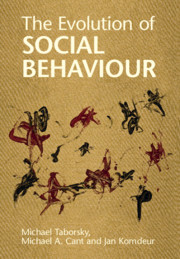3 - Conflict
Published online by Cambridge University Press: 30 July 2021
Summary
The previous chapter examined the factors that shape the evolution of competitive behaviour, focusing primarily on forms of scramble competition or racing to consume or exploit resources. Competition also occurs between individuals that interact repeatedly – what we term social conflict – which may lead to the evolution of more complex strategies of competition. In some circumstances, individuals may be selected to put their differences aside and work together as a team to outcompete other teams. Such transitions from outright conflict to cooperation have been called ‘major transitions in evolution’. The theory of major transitions tries to explain how and why many forms of life have become more complex over time, from self-replicating molecules to animal societies. Understanding how major transitions occur requires an explanation of how individual conflicts of interest can be suppressed for the good of the group. Many of the major transitions in evolution happened billions or hundreds of millions of years ago, and are difficult to study. However, a recent major transition occurred with the evolution of cooperative animal societies from solitary ancestors, and hence these societies are tractable systems to investigate how strategies of conflict and cooperation coevolve. This chapter explores the forms of conflict that arise in cooperative societies, and the social behaviours that individuals use to shift the resolution of conflict in their own favour, from aggression and escalated fighting to more subtle forms of negotiation. We show how selection can lead to the suppression of competition and peaceful resolution of conflict among social partners, uniting their fitness interests and paving the way for the final stage of a major transition, the evolution of a new, higher level of biological complexity.
- Type
- Chapter
- Information
- The Evolution of Social Behaviour , pp. 67 - 135Publisher: Cambridge University PressPrint publication year: 2021



